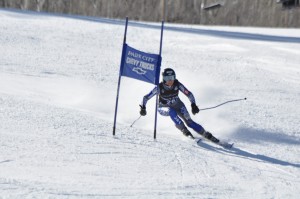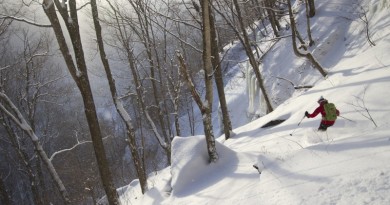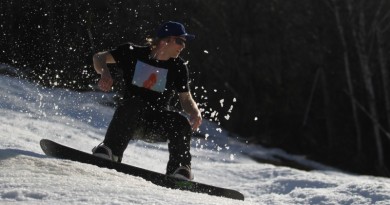Updated: VT Woman Stuck in Gondola Awarded $750,000

Updated: 1:00 am Dec. 2, 2016
By Stephen Seitz/The Mountain Times and Angelo Lynn
RUTLAND – On, Dec. 1, 2016, a Rutland Superior Court jury awarded Pittsfield resident Nadine Price $750,000 in damages as a result of a civil lawsuit against Killington Mountain Resort alleging negligence for stranding her in a gondola car for several hours on Saturday, Oct. 1, 2011. The jury award was $250,000 more than what Price’s attorney William Meub had asked the jury to consider as a minimum amount.
Price, a masters ski racer, had gone for a run up Killington. After arriving at the top of Killington Peak, she apparently opted to catch a ride down in a K-1 gondola car because the weather had turned bad.
But in a Rutland Herald report filed in October 2011, gondola operators at Killington reported they had no knowledge of Price, or anyone else, getting onto the gondola at that time. According to that report, they shut the gondola down around 3:30 because of inclement weather, unknowingly leaving Price stranded. Price was the only person stranded in any of the stopped gondola cars.
According to the Oct. 1, 2011 report in the Rutland Herald, town constables were notified of the missing woman. After two constables and Killington staff members had no success searching trails near the Snowdon Triple trail where Price had started her hike, “they began shining lights into cars on K-1 Express Gondola and found Price in one of the cars not far from the summit around 8:30 p.m.”
Price, according to that report, was not physically injured, though she was cold as temperatures were near freezing. It was also reported that she turned down an offer to go to the hospital, and instead accompanied her long-time partner Douglas Tucker to their home.
In opening arguments this past Monday, Nov. 28, Meub told the jury Price had suffered post-traumatic stress disorder based on her experience five years ago, and he reminded the jury “they had heard Price talk about having frequent nightmares and waking up in a panic since being trapped in the gondola.”
Price has since gone on to win the GS in her age group (55-59) Masters national ski racing championships in 2014 in her age group, and is currently the president of the board of directors of New England Masters.
According to the Rutland Herald’s Dec. 1 2016 report, Andrew Maass, of the law firm Ryan, Smith & Carbine Ltd. in Rutland, the attorney who represented Killington Resort, noted he “knew what he was telling the jury was hard because it involved ‘some callousness,’ but said despite the “unfortunate event,’ Price did not need medical attention and Killington had reached out to Price.”
Meub countered with a more dramatic depiction of the incident, according to the Herald’s report, saying: “This is a case about getting stuck in a gondola and the torture, and I really believe it’s torture, to be stuck up there for five hours. … One minute when nothing is going on is a long time. One minute when you believe you’re going to die is a long time.”
In the suit, Price had alleged the resort’s negligence had caused her emotional distress. According to the Herald’s report, the jury agreed that “Killington had been negligent but made no finding that the negligence had caused Price emotional distress.”
During the opening arguments of the case on Monday, Nov. 30, Tucker testified that Price looked like “she had been through a war,” when she got off the gondola.
“She kept saying, ‘I thought I was going to die!’”
Tucker also testified that Price’s personality changed completely due to her ordeal.
Before the incident, she was “happy, affable, and fun,” Tucker said. “A true delight. We played golf, and a little bit of tennis.”
Afterwards, Tucker said, Price became a completely different person.
“She was still shaking the next morning,” Tucker said. “Almost anything would act as a trigger. She was having three or four nightmares every night. Now we hardly ever go out. She used to never watch TV, and now TV is a big part of our lives. We watch the Hallmark Channel almost every day, because the stories always have a happy ending.”
According to testimony, Price had been a successful self-employed real estate attorney. One of Price’s fellow attorneys, Christopher Larson, told the jury Price had been diagnosed with post-traumatic stress disorder, and that the ordeal cost Price about $150,000 in lost business. Therapy costs are about $10,000, he added, and he asked the jury to consider punitive damages.
“She found it difficult to find clients and to finish things,” Tucker said. “She needed to be left alone and became reclusive. She became short-tempered. I try to avoid any situation which can bring that back.”
Tucker said that before the incident, Price was extremely punctual, especially when he and she hosted guests. As it happened, on Oct. 1, 2011, a friend who was visiting happened to be a nurse.
Tucker recalled his own trials that day during the testimony. “I went (hiked) all the way to the top,” he said. “I was looking under rocks and up trees. I looked in all different directions, and still no Nadine. Now it’s getting dark. The fog had come in and I hadn’t seen anything. I’d been doing this for three hours and called 911.”
While Price did have a cell phone, Tucker said, “service was terrible,” inferring she did not have adequate reception.
Killington attorney Andrew H. Maass told the jury this case differed from the typical personal injury case.
“There is no dispute that Nadine Price was stuck on that gondola,” Maass said, but he disputed the extent of the resort’s liability.
Once Price was loaded off of the gondola, Maass asked if Price had sought medical attention.
“We left that to [the nurse],” Tucker said, referring to a friend, a nurse, who was visiting.
“So there was no discussion on whether to seek medical attention?” asked Maass.
“She said, ‘No, no, I don’t need the hospital,’” Tucker replied. “We thought it best to take her home.”
Price is also alleging defamation, citing newspaper articles in which Killington officials were quoted as saying they were pondering whether to file criminal charges against Price and to seek reimbursement for rescue costs. Tucker said this infuriated Price.
“She calls herself a pariah,” Tucker said. “Her self-esteem has been damaged.”
Price, who had been a ski instructor at the resort, filed her lawsuit in 2014, after which, according to Tucker, all her privileges at Killington were revoked.
In the jury’s findings, jury members agreed that Killington had been negligent, but they made no finding that the resort had defamed her character. It is not clear why the jury awarded an amount higher than what Meub had asked.
Eds. note: An earlier version of this story contained several errors. We apologize to our readers. The story has been corrected and we will keep you updated.
Photo courtesy Killington Resort.




